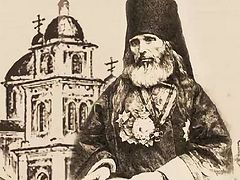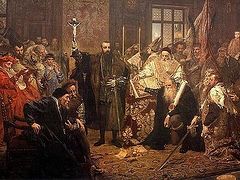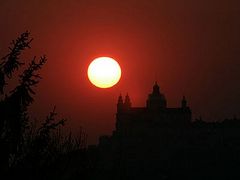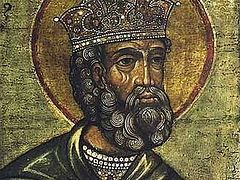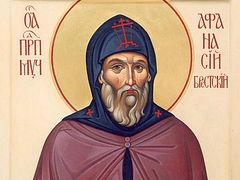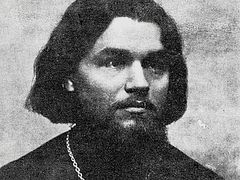In the lands of northern Ternopil region (now Western Ukraine) was the famous monastic saint, who stood against the Unia as against apostasy, against the betrayal of Orthodoxy—St. Job of Pochaev (born in Kolomy, 1551–1651), who lived a hundred years, and who was called in the world, before monasticism, John Zhelezo [Zhelezo means “iron”].
Today we celebrate the memory of this saint who stood like an iron wall for Russian Orthodoxy. Let us not forget that the territory of what is now Western Ukraine had in 1596 accepted what is known as the Brest Unia, which meant “the union with the Roman Catholic Church by a number of bishops and dioceses of the Orthodox Kievan Metropolia (at the time under the Constantinople Patriarchate), headed by the Kiev metropolitan Micheal Ragoza, on the territory of the Polish-Lithuanian Commonwealth.”
But St. Job of Pochaev, the abbot of the Pochaev Lavra, stood unwavering in the faith, and with iron steadfastness struggled against the Uniates who had left Orthodoxy for the protection of the Roman pope. St. Job was strong in spirit and faith, and it is not in vain that such multitudes of people from all over the world come today to his holy relics, which lie in a reliquary near the cave where he prayed on the Pochaev hill.
And as for the Uniates (Greek Catholics), it’s the same now as it was four hundred or so years ago—don’t trust them any further than you can throw them.[1] As if it were not not enough that they raided and seized the churches and parishes of our canonical Church, which after the far-reaching Bishops’ Council in Kharkov of 1992 began to be called the Ukrainian Orthodox Church of the Moscow Patriarchate, but in an unprecedented act, the first in history, under Ukrainian president Yushchenko, they built their cathedral church on the left bank of the Dniepr, in Darnitsa. During the “Euro-Maidan” revolution they actively carried out their “prayer protest” in the Maidan square, to the point that certain Uniate “priests” called for the murder of “Moskals” [anyone associated with Moscow, i.e., Russians], Communists, and others. Apparently the Greek Catholics took part in a neo-Nazi, neo-Banderite [followers of Stepan Bandera] coupe in Ukraine as if the whole country belonged to them, allowing them to sharply increase their expansion into Eastern Ukraine, to the canonical territory of Orthodoxy, where they had previously been only during the German fascist occupation.
* * *
It pleased God to show forth in Western Ukraine this man who pleased Him during the hour of great and terrible trials that crashed down upon the Orthodox in those regions. Here is what Metropolitan Isaiah Kopinsky wrote in 1632 to the Moscow Patriarch: “There are no pious princes, noble dignitaries have disappeared, everyone has left from Eastern Orthodoxy to the West, and one can hardly find a man among the poor and inglorious who have remained pious in the Orthodox faith.” It was precisely those “poor and inglorious”—the peasants, craftsmen, merchants, and clergy—who were faced with the struggle against the Jesuit influence, which was particularly active in those times. St. Job of the Pochaev Monastery became the strong spiritual backbone, the symbol of this struggle.
The saint lived during difficult times for Russia, when on its western borders the Orthodox people of Volhynia and Galicia were subjected to cruel ecclesiastical and political oppression from the Polish-Lithuanian magnates. St. Job witnessed the Brest Unia and the implacable Catholic invasion that followed it, as well as the growth of Protestant influence. As the abbot of the monastery he had enormous spiritual authority, and he used all of his resources to strengthen Orthodoxy, to struggle with the heterodox and heretic influences on the people’s consciousness.
* * *
The future saint was born in Pokutye in Galicia (now Lvov province, not far from the town of Kolomye) to the pious Ivan and Agafia Zhelezo, who belonged to a noble family, and who remained faithful to Orthodoxy. From the saint’s Life, which was written by his disciple, St. Dositheus, we know that from the age of ten Ivan (John) “left the sight of his beloved parents” and came to the Ugornits Holy Transfiguration Monastery in the Carpathian Mountains, where after two years he was given the small schema[2] with the name Job. Much later (apparently not long before his repose—the exact date is not known) he received the great schema.
The ascetic’s labors of prayer and pious life were not hidden from people. His fame spread throughout the entire region.
Even dignitaries began coming to the saint, asking for spiritual nourishment. He began to enjoy the particular trust and protection of the famous defender of Orthodoxy, Prince Constantine Ostrogsky. Prince Constantine made a request to the abbot of the Ugornits monastery to release St. Job to the Dubensk Monastery of the Holy Cross, located on his princely estate. The abbot consented, and after some time Job was made the abbot of the Dubensk brotherhood. He remained in the rank of abbot for over twenty years, and it is during that time that the Brest Unia was signed, followed by oppression of the Orthodox. Prince Constantine, under whose protection St. Job was, had enormous influence in Volhynia; he enjoyed the respect of the Polish king Sigismund III and Pope Clement VIII of Rome. Therefore the Uniates and Jesuits did not dare to get in the way of the Dubensk abbot’s work.
During his time in Dubensk, the saint set about disseminating Orthodox books. With this aim he engaged certain people in translation work and the copying of books. According to his Life, the saint himself participated in these labors. At the saint’s blessing, from 1581–1582 Prince Constantine published in Ostrog the first printed Slavic Bible, which is well known to historians and literary scholars throughout the world as the Ostrog Bible.
The cares and worries that go along with publishing work, as well as the Latins’ dislike of this process, distracted St. Job from his monastic labors. The Dubensk Monastery enjoyed twenty years of the saint’s abbacy, but burdened by this obedience he left that community and in around 1604, yearning for the ascetic labors of a desert dweller, he found refuge in a modest community not far away—on the Pochaev hill, where a great army of hesychasts had lived from ancient times.
* * *
St. Job sought obscurity and freedom for prayer in the Pochaev monastery, but the monks, who most likely sensed great spiritual strength in the anchorite, unanimously and tearfully begged him to become their abbot. The saint was forced to give in, and soon through his labors the Pochaev Monastery was strengthened and rose above all other Western Russian monasteries. He began to receive material support from the local nobility who had avoided falling into the Unia. Thus, in 1649, financed by the noble family of Theodore and Eve Domashevsky, a stone church was built in the monastery that was dedicated to the Holy Trinity. The imprint in stone of the healing foot of the Mother of God, along with her miracle-working Pochaev icon, were placed in that church.
But soon came disaster. In 1607, the Tatars attacked the monastery, plundered it, and killed one of the monks. In 1620, the grandson of Anna Goiskaya, the Protestant Andrei Firlei, took it into his head to kick the monks off of the Pochaev hill, and to this end robbed them of their lands. He broke into the monastery with his servants, and stole the miraculous icon. After this, Frilei’s household was stricken with catastrophes and sickness, which did not cease until the icon was returned to the monastery.
These events forced St. Job to into time consuming and laborious work. Over the course of several years he had to travel to courts and agencies until the suit with Firlei was finally decided in favor of the monastery.
As a result of huge efforts, a well was dug on the Pochaev hill so that the monastery could have water (the neighboring sources had been taken away by Firlei).
Especially important for strengthening Orthodoxy in Volhynia were the saint’s book publishing and literary activities. At the beginning of the seventeenth century, in this region there remained only one Slavic printing press—the one in Pochaev. St. Job used it for the struggle with the heterodox. Here books were published of an expository and dogmatic nature, and Orthodox prayers and epistles where also published—especially important in those conditions of Catholic expansion in Western Rus’.
For many years (until 1932!), in Pochaev Monastery was kept the work of the saint himself, the “Book of Blessed Job of Pochaev, written with his authoritative hand”, containing up to eighty discourses, teachings, sermons, and notes taken from patristic, ascetical, and polemical works (published in 1884 in Kiev in the Russian language under the title, The Bee of Pochaev).
The most important thing for the elder was the struggle with Catholics and with Protestant sects. The saint was present at the Kiev Council of 1628, called in connection with the return to Orthodoxy of Archbishop Meletius, who had fallen into Uniatism. It was St. Job who wrote the council ruling that testified to faithfulness to Eastern Orthodoxy.
* * *
Along with his visible labors, in the saint’s life were the unseen labors of prayer. St. Job finally found his solitude in the wild cave on the Pochaev hill. This cave was very narrow and tiny; within he poured out many heartfelt tears “for the world that lies in evil”, as St. Dositheus expressed it in the Life he wrote.
The saint would remove himself to the cave for a whole week, and pray for the world there, fasting strictly. (“Thou didst many times enclose thyself in a narrow rock cave for the sake of divine contemplation,” says the troparion, fourth tone, to St. Job). It was not granted to any mortal to know what was done in those hours in the cave, but one day, while the saint was praying there, “an extraordinary light suddenly shone around the cave and for the span of two hours was reflected from its depths upon the church opposite it.”
Whoever has been vouchsafed to spend time in the church-cave of the Pochaev monastery, where are the reliquaries with the relics of the pillars of Pochaev, Sts. Job and Amphilochius, will recall the awe that seizes you when you incline your heart and soul to this place, to the honorable relics of the spirit-bearing elders, who lived three hundred years apart, and who stood on the spiritual boundaries of Orthodox Rus’. What the famous Russian writer and pilgrim A. N. Muraviev wrote is true—that the primary history of the Pochaev hills should be sought out not on the “heights of the cliffs”, but in the depths of the caves.
St. Job’s relics are kept with great honor and reverent care. The beautifully adorned reliquary with the relics of St. Job stands within the natural cave, next to the crawl space leading into the saint’s cave, where he spent so many hours and days in prayer and vigil. In the cave are massive stone arches made of gray, unhewn stone, and right there is a small but rich iconostasis, lampadas, candles, the relics of the saint. The relics are covered with glass, but not completely. The hands of the incorrupt relics are uncovered, and the faithful reverently kiss them as if the righteous man were alive. The saint’s hands, incorrupt even though he reposed many centuries ago, are today still warm and soft, as if living. And a wondrous fragrance exudes from them.
Those who wish can climb through to the saint’s cave and pray there. There is an oral tradition that this crawl space has the wondrous quality of freely allowing people pass through who are pure of heart, humble, and repentant; but those who are unrepentant get “caught”, and can’t leave, until they repent before everyone of their sins.
Whoever has dived (literally dived, head first and downward!) into the tiny little cave in a small opening in the cliff, which seems to be no larger than two fists, will never forget it. At first you can’t even understand how a grown man could crawl through it. But when you climb through you’ll find yourself in total darkness. Your breathing is interrupted, your chest tightens when you crawl into the darkness, and your heart starts pounding from the unknown and wants to jump out of its cavity. An unseen servant supports you inwardly. You feel your way to the icon, touch it with your lips, collect yourself with difficulty and say three prayers. There is such a prayerful feeling in St. Job’s little cave, as if you had fallen into the Lord’s right hand, and it has gripped you like a piece of cheese, squeezing out everything extraneous and returning you once again to the real world. It is a direct, full, and clear sensation that you have stood before the Face of the Lord.
* * *
Besides prayer and divine contemplation, the saint also occupied himself with physical labor. He worked in the monastery orchard, and helped dig two ponds near the monastery, with dams.
During the military campaign of Bogdan Khmelnitsky against the Polish-Lithuanian Commonwealth, St. Job gave many people refuge in his monastery. It is also known that the saint was chosen as a father confessor by many influential people of those times. All the way up to 1649, St. Job served as abbot, and named his successor only when he was ninety-eight years old; however even after that he participated in the more important events of the monastery.
On October 21, 1651, the saint received a revelation that he would soon depart. On October 28, he served Divine Liturgy and then peacefully departed to the Lord. The saint was buried near the cave where he had labored in asceticism. A wondrous radiance was often seen over his grave. Seven years after his repose, St. Job appeared three times in dreams to Metropolitan Dionysios (Balaban) of Kiev, and informed him that the time had come to uncover his relics.
His body had lain seven years and nine months in the earth after its burial. The uncovering of his relics happened like this: On August 28, 1659, Metropolitan Dionysios headed the triumphal uncovering of the incorrupt relics (“without any corruption at all, as if they were buried in that very hour, and filled with an inexplicable fragrance”) of the saint, upon which could even be seen the wounds on his feet from the swelling caused by his long standing in prayer. The Life of St. Job says almost nothing about these wounds. But it is quite likely that his being named after Righteous Job the Much Suffering in the small schema is directly connected with this great patience that the saint had in enduring many sicknesses, his profound humility, and his prayerful labors of a stylite.
Then the incorrupt relics of St. Job were translated into the Church of the Live-Creating Trinity.
Many miracles occurred from them; for example, the fatally ill Dositheus, who wrote the saint’s Life, received healing. In 1675, through the prayers of the saint, the Mother of God saved the monastery from the Tatar and Turkish attacks. The Most Holy Theotokos appeared over the Pochaev hill together with St. Job; the arrows shot at them by the enemy returned to the shooters and struck them. The Muslims fled in terror at this miracle.
At the beginning of the eighteenth century, the Pochaev monastery was taken over by the Uniates. But the miracles and healing did not cease to flow from St. Job’s relics. Even the Uniates came to believe in his sanctity, composed a service to him with an Akathist, and requested of the Roman pope that he be canonized—a request that was rejected due to the saint’s zeal for holy Orthodoxy.
In 1831, the Pochaev Monastery returned to the Russian Church. Miraculous healings inspired the Holy Synod to open the relics a second time, which took place on August 28, 1833. Note that the dates of the first and second uncoverings match.
In 1858, a new church was built on the cave site, and dedicated to St. Job.
The Akathist to St. Job says: “O our all-blessed and God-bearing Fr. Job, instructor in the monastic, angelic way of life, unconquerable defender of and struggler for the Eastern-Orthodox catholic faith against the falsely-minded West, faithful observer and strict upholder of the God-inherited rules of the Church and patristic inheritance, great zealot of holiness and purity, chastity and non-acquisitiveness, love of labor and divine contemplation, fasting and vigil, tireless and invincible struggler of longsuffering and patient endurance, icon of meekness, mirror of humility, example of guilessness, support of fasters, praise of virgins, joy of monks and schemamonks… Protect us with thy prayers from all enemy attacks and evil circumstances, preserve and keep each and all in peace and tranquility, in unfeigned faith and a God-pleasing life.”
The Holy Dormition Pochaev Monastery received the status of a lavra much later after the sacred struggles of St. Job. And to this day, the Pochaev Lavra stands as a stronghold of Russian Orthodoxy amidst lands that have been ceaselessly subjected to Greek-Catholic invasions—and it does not give in. We should all learn from the steadfastness and inviolability placed at the foundation of this stand of John Zhelezo.
Holy Father Job, pray to God for us!






